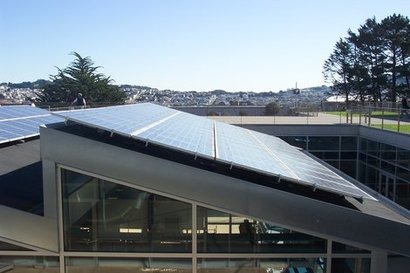
Mr Hanglin will outline the substantial potential benefits from solar, thanks to recent government legislative changes. A favourable policy environment means that property owners, tenants, landlords and managers can generate revenue and improve their green credentials by investing in rooftop solar as an energy source.
Recent changes announced by the Department of Energy and Climate Change (DECC) will enable investors, from 2019, to move building-mounted solar panels to different locations without losing Feed-in Tariff (FiT) accreditation. This should help to drive greater commercial take-up, Mr Hanglin will argue. This is because the changes remove the inflexibility of the system, which previously proved to be a major deterrent. Under the former FiT scheme, an installation had to remain in the same position for 20 years in order to maintain its accreditation.
DECC has also confirmed that schemes of up to 1 MW in size will no longer require full planning approval before permission is granted. This removes a further barrier.
“After campaigning in favour of these changes, we were very pleased that the government listened to the concerns we raised” said Mr Hanglin. “Former key investment barriers are set to be removed which will make rooftop solar a more attractive option for property owners, tenants, landlords and managers. There is significant potential that can now be unlocked for large-scale commercial solar installations. We are confident that there will be a rush to invest once businesses realise the commercial benefits of the rooftop solar opportunity.”
The All-Energy conference is one of the UK’s largest renewable energy events and will take place between 6th and 15th May 2015 at the Glasgow Scottish Exhibition and Conference Centre (SECC). Giles Hanglin will be speaking at the event’s onsite and microgeneration session at 10.30 am on Thursday May 7th when he will outline the areas that must be progressed if solar PV is to reach its full potential in the UK. Mr Hanglin will also discuss the impact on leasehold and tenancy agreements and the subsequent effect on property valuations. An additional focus will be different ownership models, the role of property valuation assessments and the steps required to unlock large scale development in the sector.
Hanglin will also provide clarification on the specific and bespoke solar insurance that de-risks the solar investment process, which Savills Energy has developed through working with several insurance brokers.
Stuart Campbell, director at Savills Energy, will also be speaking at the All-Energy conference, at the finance and funding session at 2pm on Wednesday, May 6, where he will examine effective energy performance. Nick Green, director and head of energy for Savills in Scotland, will outline how the rural economy can maximise income from renewable energy projects as part of a panel discussion at 10:30am on Thursday, May 7.
For additional information:

